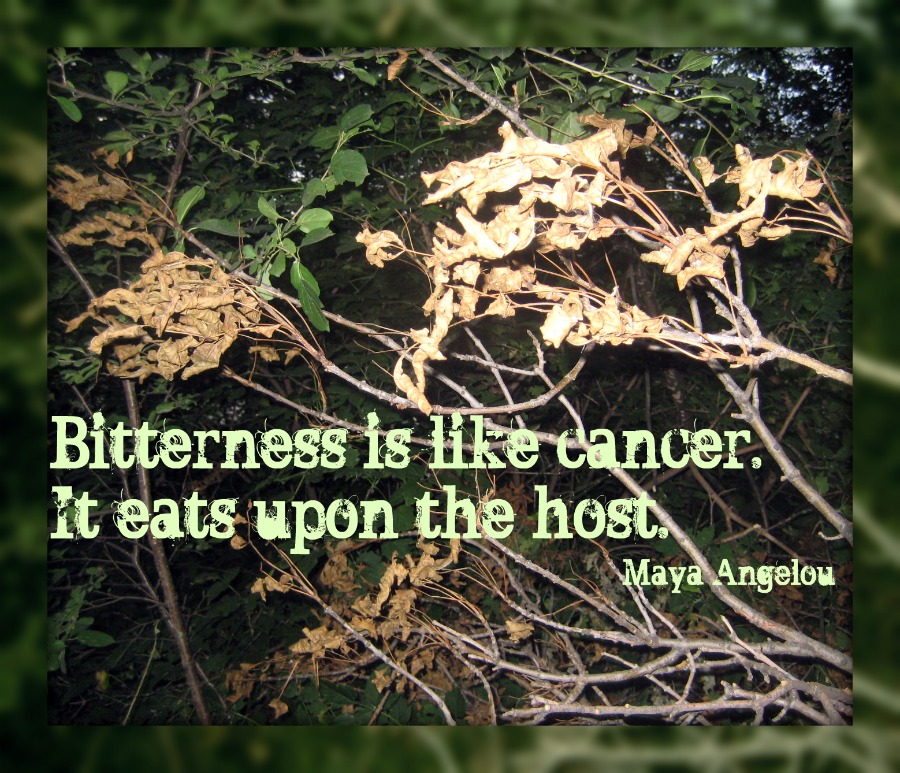Bitterness imprisons life: love releases it. Bitterness paralyzes life; love empowers it. Bitterness sours life; love sweetens it. Bitterness sickens life; love heals it. Bitterness blinds life; love anoints its eyes.
Harry Fosdick
Been thinking about the burden of bitterness and resentment lately…watching people I care about stumble under the crushing weight of woundedness. Over time that woundedness has turned to anger and hostility in a way that is slowly eating them alive.

Bitterness changes people. Creates unhappiness. Sucks joy. Punishes the holder-of-bitterness.
Something makes it more important to hold onto the bitterness than to let it go. Honoring a memory, a dream. Paying homage to the trust that was broken, or the hurt that was created—holding onto the bitterness as a way to say, “________ MATTERED, and you had no right to hurt me in that way.” People generally don’t choose the path of bitterness because they want to be miserable…it likely feels more like bitterness chooses them. Or perhaps, that a part of them chooses bitterness as the method of choice to cope with something incredibly painful…in a way that helps the wounded part in some subtle but important and real way…but also creates hurt and pain and layers of yuck.
But the bitterness pays tribute to the hurt in a way that creates further pain…distancing the embittered from those around them in ways that isolate and create distress. It’s painful to watch.
I’ve been mulling this around in my head the last couple of days. Then the verdict came in, in the trial of the murder of Candace Derksen…GUILTY. Like many in Winnipeg, this trial mattered more than most trials I read about in the paper. This one had personal elements for me. I didn’t know Candace, but I knew many that knew her, who taught her, who searched for her, who missed her, who grieved for her. I met Wilma Derksen during my stint volunteering for Child Find years ago. I read Derksen’s book,
Have You Seen Candace? I read that book as a mother…only able to imagine a little bit about what her experience must have been like, if those were my shoes to wear…even just the imagining of it was brutally difficult.
During the trial, and while waiting for a verdict, Wilma Derksen held a white rose…a symbol of purity and innocence…for the life lost, for the daughter who they never saw grow up. When prompted by the interviewer…she explained the other meaning of the rose…the symbolism of forgiveness:
The challenge is to make something good out of it…I guess I’ve been known for the word ‘forgiveness’. And it has been a word that has directed me. To me it’s not an ending, though. It’s a beginning word…we start with the attitude, ‘I want to forgive. I want to see the humanity in everyone. I want to look for the good, and leave the bad and leave the negative.’ It is going to be a symbol of forgiveness for us.
Wilma Derksen
Cliff and Wilma Derksen made a deliberate choice years ago to have an attitude of forgiveness as a way of short circuiting the easy slide into bitterness. Bitterness as the new enemy, struggling to deal with what it seems would be the ultimate act of wrong…the murder of one’s child.
This decision was deliberate, a choice made after visiting with another parent survivor of a murdered child:
He [the father of a murdered child] demonstrated and expressed a lot of anger, desire for revenge…it had ruined his health, his ability to work, his family relationships. The worst thing he said about this whole thing is that it has also destroyed the memories of his lost daughter …and that’s when I couldn’t take very much more. Is that really what’s going to happen to us? We had seen the new enemy…and we knew it was different than the first one, the one that Candace had dealt with. And so we resolved that we were going to do it together, and we were going to hang in there, and we chose the word ‘forgiveness‘.
Cliff and Wilma Derksen
(bolded emphasis mine)
I can only imagine the deliberateness of choosing forgiveness over “the new enemy”–bitterness–for the Derksens. I imagine them having to choose to remake that decision often, as anger and pain would wash over them…maybe every day; maybe at times, many times a day. Bitterness seems so much the obvious, easy, even compelling choice when facing an unknown force that took away the life of your daughter. How much more have people been bitter for much less?
Yesterday, the day after the verdict, they had plans to lay a white wreath at the grave of their beloved daughter…they planned to go there and cry. To choose forgiveness over bitterness doesn’t mean sidestepping the painful agony of loss and injustice, of mourning and missing. And then they plan to move forward into the future, seemingly with a freedom amongst the painful complexities.






Write a Comment